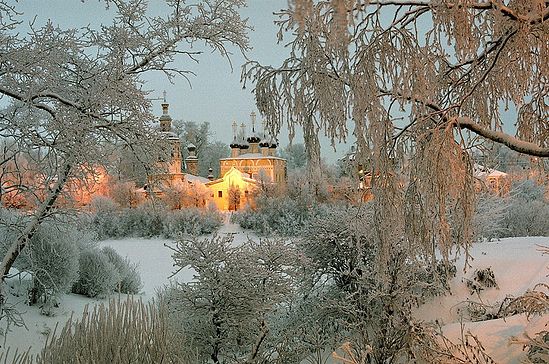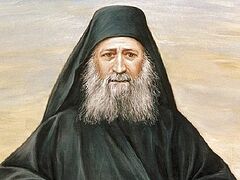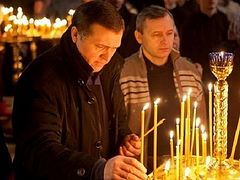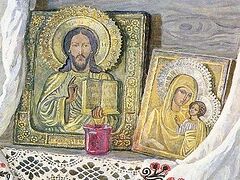All morning, Archpriest Boris, the rector of the Church of All Saints, was flooded with memories. The past was seen as bright and clear as though it were yesterday. But then, already fifteen years had passed. Perhaps a bit less…
Fr. Boris just served Liturgy. Tall, broad-shouldered, stout, with a black beard beginning to turn gray, Batiushka blessed the people. People were coming up to the cross. There were a lot of them—there was a whole line. Joyful eyes. They awaited his look, his smile, his attention, his pastoral care. And he looked at his parishioners with paternal love.
There was an elderly couple. He recently prayed for them—they were both sick at the same time. He sent young sisters to them from the parish. And Michael just returned from a trip. Already a month has passed since a moleben was served for this traveler. There’s Tatiana with her husband Alexei and their son. Fr. Boris recalled how he baptized the father and son at the same time. At first, Alexei didn’t want to let Tanya go to church. Then he went with her once, and he stayed. Now he’s one of the most active parishioners, helping with repairs and other tasks. And there’s old Claudia—she’s at church day and night.
Accompanying the old woman with a look, Fr. Boris suddenly recalled how fifteen years ago it was only Claudia and the watchman Feodor coming to the cross. There were no other parishioners in the old church. He would walk past the half-empty candle stand towards the exit, and the old icons looked so sad in the semi-darkness.
Batiushka closed the gates, but the parishioners were in no rush to disperse. Only those who were especially in a hurry left, while the rest gradually gathered in the trapeza for the Sunday meal as usual. The trapeza was large and the parish friendly. At that time, at the very beginning of his ministry in this church, he could barely feed not just Claudia and Feodor—it was difficult enough to feed himself. Yes... But why are these memories coming to mind today?
The high, narrow windows of the altar with their delicate latticework were being battered either with snow or rain, or perhaps it was snow with rain. The light from the multi-colored lampadas and the yellow flames of the candles in the altar seemed so warm and familiar compared to the gloomy, barely glimmering twilight of the just-beginning November day. And the memories came back so vividly that Batiushka even had to sit down on a chair. It was the same wet and cold November morning. Fr. Boris remembered it his entire life. Perhaps it was one of the turning points in his life.
You know how it is: Someone is going along his path in life and comes to a fork in the road, with several roads branching out. Yes, those same roads that we choose. And with them we choose our fate. It’s a shame that we often don’t notice this fork, hurrying and rushing at full speed. And only years later, recalling the past, do we clearly see ourselves at a crossroads, at this intersection of roads and destinies.
It was Saturday then too, and he had also just served Liturgy, except the church was cold and empty. Old Claudia was huddled by the stove, and the forever-frowning Feodor went out right after the service to get an armful of wood. Two old women from the choir wrapped in tattered shawls were wandering towards the exit. Before they could open the door, it swung open itself and a woman in her mid-forties ran in with a gust of wind. She wasn’t exactly dressed like a church-going woman: in pants, a sheepskin coat, and a fur hat instead of a headscarf. But her hat was slightly askew, her coat open, and tears running down her cheeks. She clumsily ran towards Fr. Boris and fell at his feet weeping. Fr. Boris barely managed to calm her down; he sat her on the bench and asked about her misfortune.
It turns out the woman’s name was Elizabeth. Her daughter, Tanya, and her newborn grandson Egor were in the ICU. The whole family had been waiting for this child! They had thought of names long ago. If a girl, then Elena, and if a boy, then Egor.
“Our Egorka was born! Our baby, our darling sunshine! Tanechka, my poor daughter! My own flesh and blood!”
The woman started sobbing again, and Fr. Boris could barely get it out of her that the birth was difficult: Her daughter lost a lot of blood and fell into a coma, and the child was born in a state of asphyxiation and with some kind of pathology. Both were on artificial respiration. The grim ICU doctor said the diagnosis didn’t look good. An experienced nurse we knew overheard a meeting of the concilium gathered in the ICU and whispered to Elizabeth that her daughter and grandson were dying—it was just a matter of when to disconnect the apparatus.
“Our old babushka told me to run to you, at the church. She said to ask for help from God and for your prayers, Batiushka! Help, please, help, Batiushka! Please! You can! Can’t you? You’re a priest! God will listen to you! Who does He listen to if not you?! My Tanyushka! Little Egorushka!”
And the woman started sobbing again. Fr. Boris felt his heart squeeze. He felt very sorry for this young mother, who never saw her long-awaited son. He pitied the child who was dying, never having been held to his mother’s breast, having never been met by the love his entire family. His crib and toys (presumably they’d bought them) would not get to meet their little owner. And somewhere there is the young husband, the father, who would lose both his wife and his long-awaited son at the same time. Instead of joy, everyone will be standing in the cold November wind at two snow-covered mounds. This image immediately flashed through Batiushka’s mind, and he shook his head, driving away the evil vision.
“Calm down, Elizabeth! Everything will be fine! Everything—will—be—fine, do you understand?! The Lord is merciful! He will save both mother and child! Let’s pray and entreat His mercy! He will certainly help!”
Elizabeth gradually stopped sobbing, and looked up hopefully:
“Yes, mama always said that God exists! And if He exists, He will certainly hear you! That means everything will be okay! Isn’t that right? They’ll recover?”
Fr. Boris led the woman to the door. With a weary sigh, he started to get ready to go home. He wasn’t in a hurry to get there lately. Matushka Alexandra had gone to see her parents, taking their son Kuzenka with her. Batiushka had been serving in this small Ural town for three years already. And that whole time, services were held in an empty church.
The people in the town worked a lot and lived poorly, and in the summer they preferred to work on the land at their dachas, growing some simple crops for the winter. In the winter, the women spend the weekends doing laundry and cleaning, baking pies, and watching TV. The men gather in their garages where they drink white wine under the pretext of doing repairs. Many of them wound up in church not by their own will, but feet first: It was common to die from carbon monoxide poisoning in the town, as when after drinking his share of white wine, some man would decide to warm up, turn on the engine, fall asleep, and never wake up again. The rest were also in some kind of terrible dream, as if they’d buried a friend and were now going to drink to his soul in the same garage.
Matushka Alexandra, thin and frail, shivering in her shawl, said:
“I’m afraid for these people. They live day to day, never thinking about God, about their souls, about the meaning of life, about what will happen there, beyond life’s threshold… Father, let’s leave here! For some other, bigger city. We won’t live to see more parishioners. And there won’t be any help for the church, nor for you and I, Father. We’ll be in poverty our entire lives. We don’t even have enough money to get fruit for Kuzenka.
Fr. Boris was wearily silent. In the first year of his appointment, he really hoped that a flock would soon appear, that parishioners would come to the church, whom he, as the pastor, would lead on the path of salvation. But the church was full only on Theophany, Nativity, and Pascha. People came for holy water on Theophany, at Nativity they were merry, silly, often drunk; and on Pascha they came with the obligatory eggs and Pascha breads. The rest of the year, the church was empty.
 St. George of Chekryak In this first year, Fr. Boris often read, sometimes even aloud for Matushka, the story of the priest George Kossov, who served for two years in the village of Spas-Chekryak in the Oryol Governorate in an empty church, without parishioners. No one went to the young priest’s services. The evil one tempted him with the thought of tossing everything and running away. He was frightened. He went with his grief to the Optina Hermitage to Elder Ambrose. And St. Ambrose, seeing this sorrowful Batiushka, clairvoyantly spoke words of comfort to him.
St. George of Chekryak In this first year, Fr. Boris often read, sometimes even aloud for Matushka, the story of the priest George Kossov, who served for two years in the village of Spas-Chekryak in the Oryol Governorate in an empty church, without parishioners. No one went to the young priest’s services. The evil one tempted him with the thought of tossing everything and running away. He was frightened. He went with his grief to the Optina Hermitage to Elder Ambrose. And St. Ambrose, seeing this sorrowful Batiushka, clairvoyantly spoke words of comfort to him.
Fr. Boris read these words of the great elder to the future Hieroconfessor Fr. George aloud and felt his heart respond with an instant surge of joy.
Fr. George wrote about it like this: “When Batiushka Ambrose saw me, without asking me anything, he directly said to me: ‘What, are you afraid, priest? He is one, and you are two!’ ‘How so, Batiushka?’ I said. ‘Christ God and you—that makes two! But the enemy—he’s alone… Go home,’ he said, ‘and don’t be afraid of anything to come; yes, a big stone church, and don’t forget to build it warm! God bless you!’ With that I left. I got home, and I felt a weight had been lifted from my chest. And all my fears fell away.”
By the prayers of the Elder, this batiushka’s church was soon filled with parishioners; it turned out to be a good, friendly parish. Fr. George grew up to be a real pastor and became known far beyond the borders of the Oryol Governorate. Having the gifts of clairvoyance and healing, the zealous pastor helped every tormented soul. According to eyewitnesses, Oryol pilgrims who would go see the great St. John of Kronstadt would hear from him: “Why did you come here? You have Fr. George Kossov!”
Then a large stone church was built in the village, with three altars, because the old church could no longer accommodate all the parishioners. Through the efforts of Fr. George, a hospital, an orphanage, and a grade school—the only in the district—were built in the village.
But in the second year of his ministry, Fr. Boris read this story less and less. He thought that he didn’t have an elder to pray like this. And he himself, apparently, was an unworthy priest. And the homilies that he spent a long time carefully preparing and then read in an empty church seemed to him quite pathetic and unconvincing.
Yes, he is a bad pastor. He’s too young, he looks completely unpresentable, and his beard doesn’t grow well. In embarrassment, he stammers from excitement. Who would listen to him—so indecisive and shy, and blushing when asked for a blessing? And he’s unable to pray. He has no boldness in prayer. And people don’t come to church.
By the end of the third year, Matushka took Kuzma and went to her parents’. She went for a visit, but hasn’t returned for three months already. Fr. Boris desperately missed her and the two-year-old Kuzma. Passing by his crib, he would stop and pick up his favorite toy—a teddy bear, stroking his velvety ears and the brown button of his nose, thoroughly chewed up by his son, and with a heavy sigh, would say to the teddy:
“Soon, soon our Kuzenka will come! Just wait a little bit more. It’s wet and slushy now. How can such a young one travel? Then there will be snow, and Sasha and Kuzenka will come. We’ll go sledding and build snowmen.”
But today Fr. Boris didn’t go to the teddy bear. If the bear could, he would have been surprised at how unusual Batiushka looked: Always tidy, today he came into the room in his shoes, went over to the icons, and fell to his knees. And if the teddy bear could hear, he would have heard Batiushka weeping:
“Lord, forgive me, the unworthy one! I answered that poor woman as if I were sure that You will hear my prayers! Lord, I don’t even know how I dared to give her hope. I don’t even know how to pray properly. Forgive me, please! Don’t confound Your servant Elizabeth’s hope in Your mercy! Be merciful, Lord, be merciful! The young child, Egorka, and his mother Tatiana—do not deprive them of Your mercy, O Lord our God! I also have my Sashenka and a son, my dear Kuzenka… And if they… Most Holy Theotokos, accept my unworthy prayer. Have mercy, O Lady, have mercy, and turn sorrow into joy. Do not forsake us sinners, having no boldness to look up to the heights of the glory of Your Son and our God!”
Batiushka didn’t remember how long his prayer continued, how many prostrations he made in the cold room before the holy icons. When he could no longer weep and pray, he struggled to his feet, but could not immediately straighten himself out. So, limping, he went over to the window, leaned his flaming forehead against the cold glass and, instead of the dirty blackness he saw a snow-white street. The falling snowflakes sparkled in the light of the streetlamps—everything seemed so clean, so joyful. Batiushka felt that his pain and anxiety were gone, and peace and quiet appeared in his soul. The clock struck one in the morning. It was already late, and he had to serve Liturgy tomorrow.
Quietly rejoicing at the spiritual joy he’d found, Fr. Boris went over to his son’s crib, stroked the head of the teddy bear, and smiled.
The next morning, Sunday, when he was already vested and preparing to serve Liturgy in the empty church, an unusual thing happened. First, Batiushka heard loud, happy voices. When he looked out of the altar, the first thing he saw was a shining white spot coming towards him. Fr. Boris went down the steps and saw that the spot was a huge bunch of white roses. They were being carried by the woman from the day before, Elizabeth. And behind her came a young man, an older man, two young girls, and a beaming old woman.
They bowed to him, eagerly trying to tell him something. It took some time for him to understand everything they were trying to say. Tanechka and Egorka were alive! And not just alive, but already transferred from the first floor of the ICU to the second, to the children’s department. And their recovery was instantaneous. The entire medical staff of the hospital was talking about the miracle.
The nurses were sitting by Tanya and Egorushka in agony, waiting. All of a sudden, they simultaneously saw how the dying patients’ vitals returned to normal, and the dying patients themselves woke up. Tatiana started asking about her child, and Egorka began to cry, demanding food. Nurses from different rooms rushed to the doctor on duty and collided on his doorstep. Most importantly, at the same time—at one in the morning! What a miracle!
Fr. Boris served the Liturgy and then gave a homily. They listened to him attentively: Elizabeth, the two men, the young girls, and the beaming old woman. Feodor and Claudia stood there joyful and content. The babushkas on the kliros sang unusually harmoniously. And when Fr. Boris finished his homily and everyone went up to the cross, he realized that not once had he gone astray. He hadn’t even stammered, because he wasn’t thinking about what he said or how he looked.
He was thinking about the people who were standing before him in anticipation of his pastoral word, his prayerful presence before God. He looked at them, his first true parishioners, and felt love for them. And that’s how it happened! You need to feel this love, this anxiety and pain. Then a pastor is born.
And the sheep hear His voice: and He calleth his own sheep by name, and leadeth them out… He goeth before them, and the sheep follow Him: for they know His voice. And a stranger will they not follow, but will flee from Him: for they know not the voice of strangers… The Good Shepherd giveth His life for the sheep (Jn. 10:3-5, 11).
When Fr. Boris was on his way home, it seemed to him he had grown ten years older. He was also very tired. But his soul was light.
When he got to his house, at first he couldn’t understand what was wrong. Then he realized the lights were on in the house and smoke was billowing from the chimney. Fr. Boris felt a sting in his nose and wanted to cry. Without hurrying to enter, he stood on the porch and listened to the sweet voice of Sasha and the chatter of Kuzenka reaching him. Snow was falling. And the heavens and the earth became completely different—new, snow-white.





